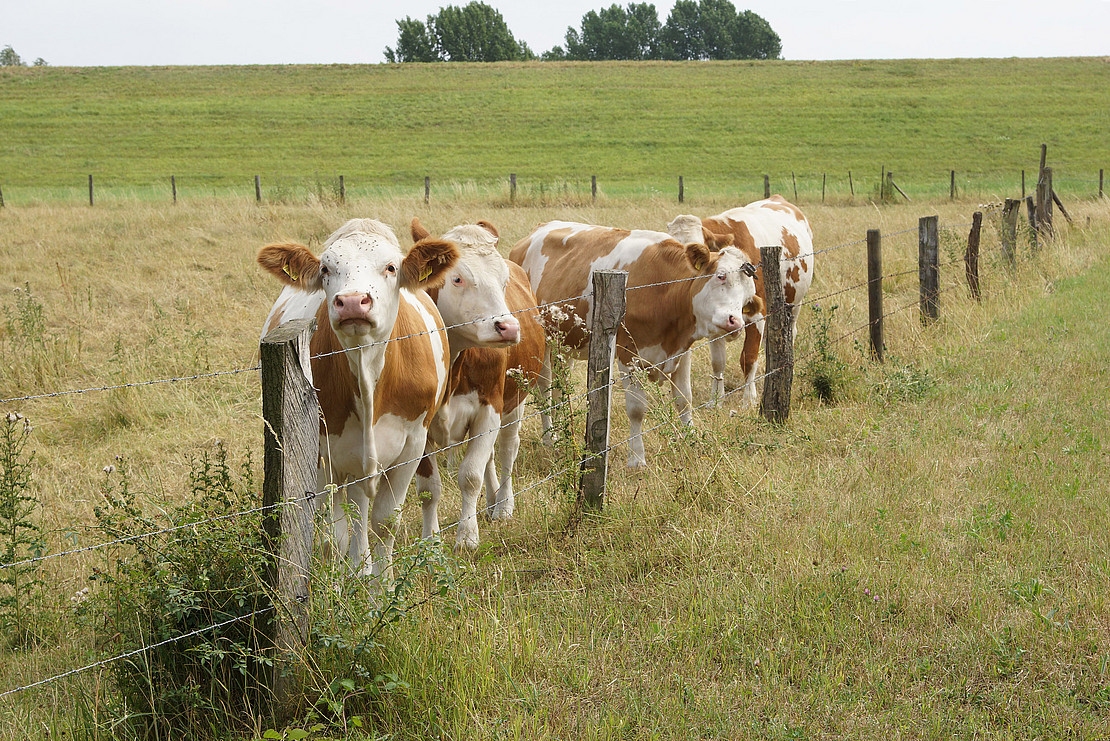This page contains automatically translated content.
GreenGrass wants to put cattle back on pasture
 Image: ullihaessler/flickr
Image: ullihaessler/flickrThe project will explore how novel technologies can be used to keep cattle in the landscape without labor-intensive grazing and fencing systems, while respecting nature conservation requirements. This will help maintain biodiversity on grasslands and make the landscape more attractive.
In meadows and pastures that are heavily fertilized and cut at short intervals, species diversity decreases significantly. "This creates problems for the diversity of organisms living in and on the soil and for functioning ecosystems. Not only nature, but also people benefit directly and indirectly from stable ecosystems, intact nature and a diverse landscape," says Prof. Dr. Ulrich Hamm, head of the agricultural and food marketing department at the University of Kassel. He adds that it is also important for animal welfare to bring cattle back to pasture. That is precisely the goal of the project.
But there are also disadvantages associated with a resurgence in pasture use. For farmers, keeping cattle on pasture involves extra work and costs for fencing. Second, grazing requires more land, which is not always available. Finally, nature conservation can be affected if meadow nesting birds (birds that raise their offspring on the ground) or plant species threatened with extinction (for example, orchids) are encountered on the grasslands. In order to meet nature conservation requirements, the areas must then be closed to grazing for several weeks.
The project part, under the responsibility of the University of Kassel, aims to establish a link between consumers, farmers and the food trade. By communicating the benefits that grazing brings to animals, people and the environment, an appreciation for products from animals raised on pasture is to be built up. For this purpose, the responsible team is engaged in the development and testing of communication materials and a labeling system for food produced in this way. As part of the project, consumers' willingness to pay for GreenGrass products is also being determined with price tests in grocery stores.
Through the "Agricultural Systems of the Future" strategy process, the German Federal Ministry of Education and Research is funding innovative development approaches to sustainable and efficient food and feed production. A total of eight research projects are being funded, which were selected from 140 research proposals in a two-stage application process.
GreenGrass is initially designed to run for five years, but can be extended to up to 15 years if the evaluation is positive. The project is coordinated by the University of Göttingen, Department of Grassland Science (Prof. Dr. Johannes Isselstein). In addition to the University of Kassel, the project partners are the companies Texas Trading and Horizont Group GmbH, the University of Giessen (animal ecology), the University of Cologne (remote sensing), the Humboldt University of Berlin (remote sensing and agricultural policy), the Brandenburg University of Technology Cottbus-Senftenberg (environmental economics), the University of Hohenheim (agricultural business administration), and the Grassland Center Lower Saxony/Bremen e.V. The project is being carried out in cooperation with companies from agriculture, the food industry and the food trade, as well as with administrations and nature and landscape conservation associations.
Further information: https://www.uni-kassel.de/fb11agrar/fachgebiete-einrichtungen/agrar-und-lebensmittelmarketing/forschung/greengrass.html
Contact:
Prof. Dr. Ulrich Hamm
University of Kassel
Department of Agricultural and Food Marketing
Phone: +49 5542 98-1285
E-mail: hamm@uni-kassel.de